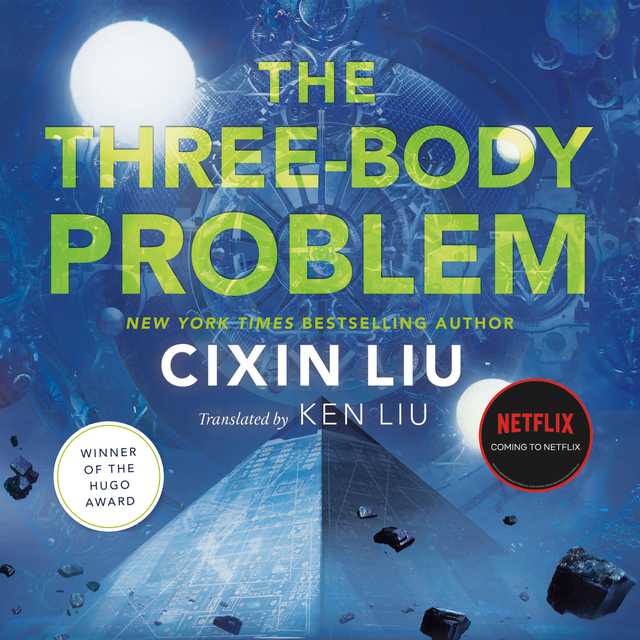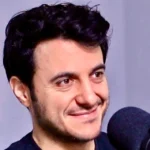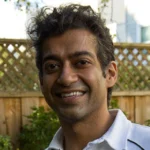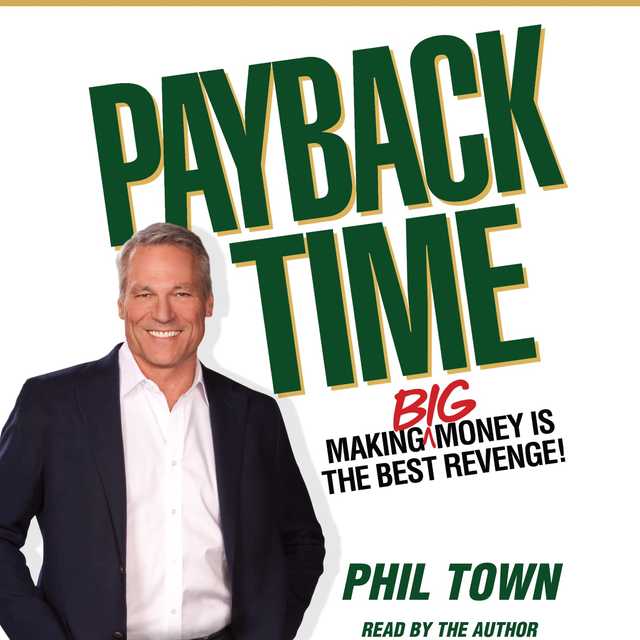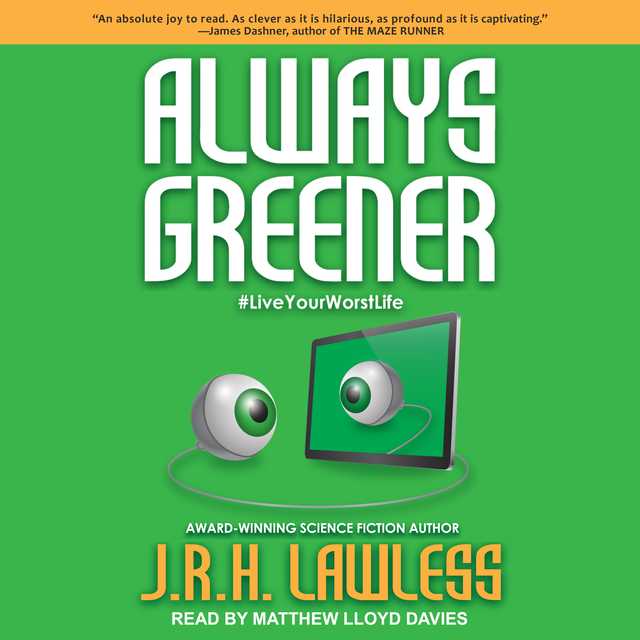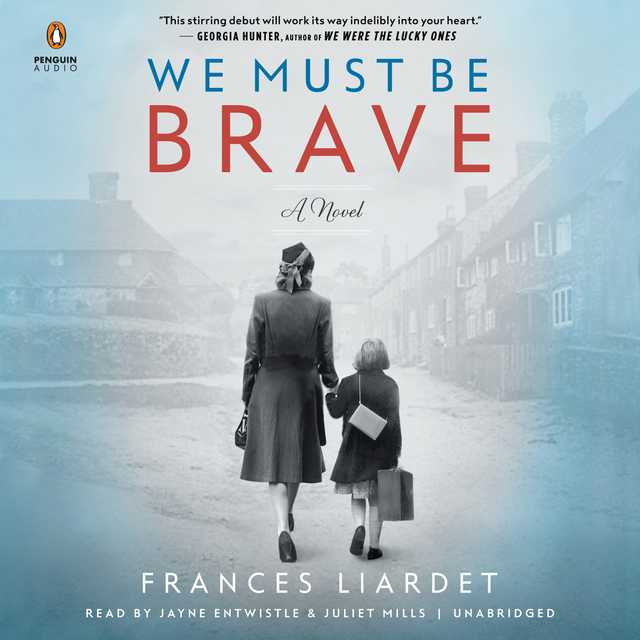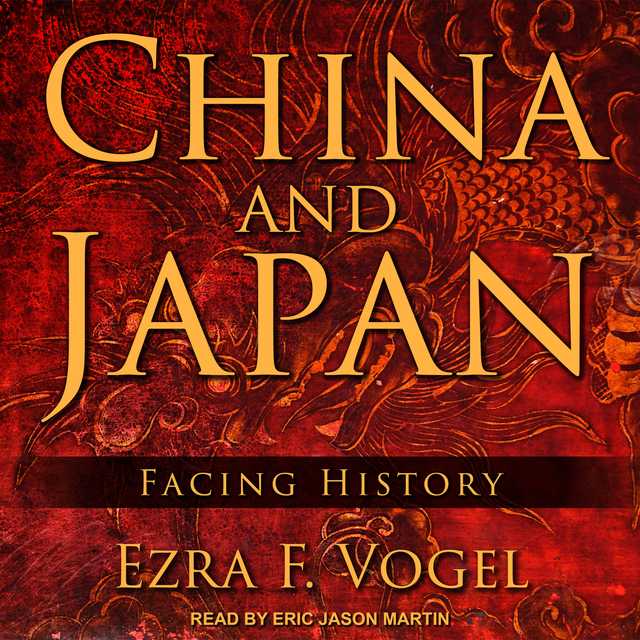Recommended by 2 experts
The Three-Body Problem Audiobook Summary
Soon to be a Netflix Original Series!
“War of the Worlds for the 21st century.” – Wall Street Journal
The Three-Body Problem is the first chance for English-speaking readers to experience the Hugo Award-winning phenomenon from China’s most beloved science fiction author, Liu Cixin.
Set against the backdrop of China’s Cultural Revolution, a secret military project sends signals into space to establish contact with aliens. An alien civilization on the brink of destruction captures the signal and plans to invade Earth. Meanwhile, on Earth, different camps start forming, planning to either welcome the superior beings and help them take over a world seen as corrupt, or to fight against the invasion. The result is a science fiction masterpiece of enormous scope and vision.
The Three-Body Problem Series
The Three-Body Problem
The Dark Forest
Death’s End
Other Books
Ball Lightning
Supernova Era
To Hold Up The Sky (forthcoming)
Other Top Audiobooks
The Three-Body Problem Audiobook Narrator
Luke Daniels is the narrator of The Three-Body Problem audiobook that was written by Cixin Liu
CIXIN LIU is the most prolific and popular science fiction writer in the People’s Republic of China. Liu is an eight-time winner of the Galaxy Award (the Chinese Hugo) and a winner of the Chinese Nebula Award. Prior to becoming a writer, he worked as an engineer in a power plant. His novels include The Three-Body Problem, The Dark Forest, and Death’s End.
About the Author(s) of The Three-Body Problem
Cixin Liu is the author of The Three-Body Problem
More From the Same
- Author : Cixin Liu
- The Cretaceous Past
- Supernova Era
- Death’s End
- To Hold Up the Sky
- Ball Lightning
- Publisher : Macmillan Audio
- Tor.com Collection: Season 2
- Sin du Jour
- The Dry
- Kathy Griffin's Celebrity Run-Ins
- I'm Writing You from Tehran
The Three-Body Problem Full Details
| Narrator | Luke Daniels |
| Length | 13 hours 26 minutes |
| Author | Cixin Liu |
| Category | |
| Publisher | Macmillan Audio |
| Release date | November 11, 2014 |
| ISBN | 9781427251992 |
Subjects
The publisher of the The Three-Body Problem is Macmillan Audio. includes the following subjects: The BISAC Subject Code is Fiction, Hard Science Fiction, Science Fiction
Additional info
The publisher of the The Three-Body Problem is Macmillan Audio. The imprint is Macmillan Audio. It is supplied by Macmillan Audio. The ISBN-13 is 9781427251992.
Global Availability
This book is only available in the United States.
The Three-Body Problem is recommended by
Tim Urban
Tim Urban has become one of the Internet's most popular writers.
Rocked my existence for a few months.
Goodreads Reviews
Yun
January 20, 2023
I'm going to call it right now. Even though I only just finished book one, I'm certain The Three-Body Problem will go down as my favorite sci-fi series of all time.This book blew my mind so thoroughly that it leaves only destruction in its wake. Where could Liu Cixin have possibly come up with all of these ideas and concepts? No wonder everyone says this is wildly imaginative. Even a single one of the ideas in here would have sufficed for a book of its own, but to put them all together into a single cohesive epic tale is absolutely jaw-dropping.The pacing is relentless and the surprises just keep coming. In fact, it has more twists and turns than most mysteries and thrillers I've read. Not only is the story utterly riveting, but it's also insightful and thought-provoking, touching upon science, politics, philosophy, and history. I found myself glued to the pages. I wanted to inhale the story as fast as I could, but I had to slow myself down periodically to reread and fully absorb all that the book was trying to tell me.This is my favorite type of science fiction, one that puts science front and center and unabashedly celebrates everything about it. There's no handwaving, no hocus pocus. Every point brought up is eventually explained via actual science in ways that made complete sense. And what ingenious explanations they are, sure to stun and amaze any reader.I found the initial pages, set during the Cultural Revolution, to be enlightening. This was the defining event of my parents' generation, yet they hardly talk about it. How do you put into words the frenzy that overtook a whole country, such that science and learning were denounced, and friends turned on friends, neighbors turned on neighbors? It's like a fever burned through the population, and left famine, trauma, and destruction in its wake. This emotionally fraught experience influences all who went through it, including the characters in this book.With translations, there's always the fear that some vital but intangible part of the story will be lost. And this is especially the case when the two languages in question do not share a common linguistic ancestor, so translating between them is not as simple as one-to-one. In the translator's notes at the end of the book, Ken Liu mentions that he was cognizant of this and tried hard to preserve not only the story, but also the cadence and feel of the Chinese language and culture in his translation. I think he did an excellent job.One thing to note is that the official book blurb is quite short for this story, but in my opinion, even that gives away too much. This is a book best experienced blind, so if you're going to read it, don't look up anything about it ahead of time. What a tremendous way to start the trilogy. My expectations for the remaining two books are sky high, and I'm assured by everyone I know who has already read them that they will be met and exceeded. I have no doubt only goodness awaits me.~~~~~~~~~~~~See also, my thoughts on:#2. The Dark Forest#3. Death's End The Cretaceous Past~~~~~~~~~~~~
Rick
February 18, 2016
** spoiler alert ** Adult sci-fi. By Chinese author Cixin Liu, The Three-Body Problem takes a classic scenario -- contact with alien life -- and cranks up the sinister factor to maximum. The story begins during the Cultural Revolution when young Ye Wenjie watches her scientist father beaten to death by fervent revolutionaries. She is sent off for hard labor at a re-education camp, but by a strange twist of fate gets a chance to work at a top secret government project seeking out extraterrestrial life. Fast forward to the present, when nanotech scientist Wang Miao is snatched up by cops and brought to a secret meeting of military officials who are fighting an unnamed enemy -- some force that is trying to destroy the roots of human science and technology by killing scientists or driving them to suicide. Wang goes undercover in this strange conspiracy when he started playing a virtual reality game called The Three-Body Problem, which only the most brilliant scientific minds can hope to beat.The premise is fascinating and well-grounded (as far as I can tell) in hard science. The book raises haunting questions: Do we really *want* to contact other civilizations? If you had the chance to pull the plug on the human race, would you do so? Is science truly objective and provable, or is it simply the best we can do given our limited understanding of four dimensions? I found the novel a bit of a struggle until about halfway in. There are a lot of characters, and many of them seem like ciphers to advance the plot or mouthpieces to espouse ideas rather than living breathing people. Sometimes the prose seems like the summary of a novel rather than a novel. However, the ideas are compelling. This is about as close to "mind-blowing" as any book I've read. If you like big ideas and fantasy based on hard science, this is worth a read.
Emily
August 04, 2020
PUBLIC ANNOUNCEMENT I just rated a book 5 stars. Just read it.**Update now that I've read the whole trilogy!**This is now one of my all time favorite sci-fi series. The concepts are brilliant and I fear that I'll never find anything this mind-blowing.With that said... the books are quite sexist (the first half of the first two books are quite slow and painful) but I still recommend them if you can stomach it.They're incredibly science heavy but anyone interested in space and first contact with aliens needs to read this!
Mario the lone bookwolf
May 06, 2022
Comparing Cixin to Arthur C Clarke, as the press did, might be appropriate. Reread 2022 with extended reviewHostility towards science ruins everythingIgnorance and especially ideology fueled hate against science, and especially scientists who were torchbearers of the unwanted, enemy ideology are a certain way to ruin your world domination plans. No matter if Catholic church, the Nazis with their weird physics ( infodump, no required reading, and uchronia overkill: if they wouldn´t have been antisemitic, but instead anti communism, anti American capitalism, anti Muslim, etc., they would possibly have had the correct science to first build nuclear bombs. Because many people at the Manhatten project would have stayed in Germany) or, in this case, the Chinese. As soon as one bans certain science and doesn´t allow research, degeneration sets in, and keeping pace with more enlightened competitors becomes impossible. Cixin shows the historic examples and contrasts them with near future science, showing how far we came in such a short period of time thanks to the rise of science, relativizing the depressing beginning. Epic, flowery language, which is unusual for the genre First, this seems more like an extremely well written, average nonfiction novel, because the science comes slowly (but boy, how it finally comes), and all the metaphors and character fused and focused exposition make one as interested in the characters as in the story itself, which is amazing for a genre that often prioritizes plot and worldbuilding over protagonists. Especially towards the second half and end, this acceleration leads to a culmination of both style and world that is a rare, exceptional enjoyment in the genre.Unique ideasI can´t really mention much without spoilers, but this work has some mindboggling, ingenious ideas I´ve hardly ever seen in other sci-fi works, not even close. It may be Cixins´technical background that made him finetune such pearls of the genre into his work and, if I got it right, even added some innuendos to Chinese history and military tactics, although I am far from sure und too unknowing to definitively confirm that conjecture. Drawing a (big) history picture of ones´ countrySome other authors, I am too lazy and procrastinating to remember and name them here, did already use the real, alternative, future, alternative past, etc history of their countries to give great edutainment lectures of the sociocultural, epigenetic evolution and that it could have been completely different, often just decided by one improbable random event, a prodigy inventing or discovering something, or a lunatic hate preacher made god king, leader, or elected democratic president, whatever the difference is. ( Personal opinion: It´s not as if voting all few years and having a work environment that´s just slavery with extra steps, and sometimes even free social services in Europe at least still, speaks of true sociocultural evolution. See freaking end of history drivel. It´s just less inhumane and politically correct, but it stayed a de facto dictatorship.) That´s not just entertaining, but a great way to learn more about foreign cultures too, especially with the subtle criticism and satirizing element sci-fi loves to add to everything in general and which makes it the best genre of them all.Maybe a bit too hard for the beginning and average sci-fi readerOne prone to the genre and used or even in some theoretical concepts will enjoy it, for others it might be a bit too much, especially because so many protagonists are scientists too to make the infodumpy technobabble Elysium more credible and better and easier to plot. Skimming and scanning the theoretical, as in other less hard sci-fi works, isn´t a solution in this case too, because everything is so interconnected that one won´t get the whole picture anymore without it.Old perspective before reading the whole trilogy:Can´t wait to see how the other parts are, especially regarding its outstanding role in the genreWhat I´ve heard, Cixin did an amazing job in connecting the whole trilogy, especially regarding the scientific, main tropes fueling this new milestone of the genre. With other of my favorite genre authors, whose perfect deliveries I do already know and love, this wouldn´t be so exciting, but because of the special, fresh taste of this first piece of orgiastic sci-fi nerdgasm, I am so looking forward to reading the next parts as unprepared and curious as I could be. And, without being narcissistic (again), this means something.New view after having been enlightened and proselytized to just believe in the almighty Flying Spaghetti Monster:This trilogy owns close to everything just aspiring to be a big sci fi we´re so small in comparison moment. If you can handle this epic triple, you´ll begin a never ending love affair with the best genre to rule, vivisect, and cosmic body horror them all.Tropes show how literature is conceptualized and created and which mixture of elements makes works and genres unique: https://tvtropes.org/pmwiki/pmwiki.ph...
Bradley
September 18, 2015
From the opening, I was struck by how much history I didn't know about China's Cultural Revolution. It might be obvious to anyone growing up in those parts, of course, but I was almost lost in that story long before I saw that there was anything sci-fi about the novel. This is a good thing. It speaks of good writing.And then things changed. I became a frog in a pot. Small hints accumulate, surrounded by mathematical problems both fundamental and curious. And then the MC's sanity is questioned. It's an open question that both the reader and the character must answer.And then I got an idea. I could easily make the argument that all scientists in this novel are actually Main Characters, and indeed, that theory only becomes crystal clear later in the novel. It was a delight.The novel is full of scientist suicides, damn odd hallucinations, all the way to a fantastic virtual reality game that draws intellectuals from around the world before devolving into a suggestive epic space opera featuring some of the most interesting aliens I've read about in a LONG time.The worldbuilding is top-knotch-squared.The clever uses of technology are the true highlights of the novel, and I'm upset. Why? Because the translations and publications for the next two novels are still in the future. Why am I still upset? Because I can hardly find the other works for this great author.A grandmaster of Chinese sci-fi? I can't deny the fact. And just because I can't compare to other science fiction masters of Chinese literature is a null point. I am already a fanboy. I'll be revelling in every work I can get my hands on.This is a fantastic example of how great science fiction can be. Truly inspiring.Update.This novel now a Hugo Nominee for 2015 because of the translation and introduction into the English-speaking market. It is a last minute replacement for Marco Kloos's Lines of Departure that was bravely self-removed due to the Sad Puppy 3 controversy. It wasn't his fault, and he got caught up in some seriously not-cool BS with this year's Hugo. He should be treated like any other Hugo Nominee. With respect and awe for the accomplishment it is, even though he withdrew.On the other hand, after finding out that Three Body Problem took his place, I have to admit that it couldn't have happened to a better novel. I loved this one. It was really fantastic and it had everything I like to see in seriously good fiction.This one might truly be my top pick for the year. It might be the one I cast my ballot on. But first, I need to read a few more Nominees. I take this very seriously. We bring our levels of joy and dedication to the ideas we thrive on. Awards are only as good as we make them. I refuse to let the Hugo become a quagmire.Let the best novel win!Brad K Horner's Blog
Baba
May 21, 2022
Remembrance of Earth's Past #1: This book won the 2015 Hugo Award for Fiction despite being originally published in Chinese/Mandarin(?) in 2006! How good does a book have to be to sweep all before it at the Hugo's nearly a decade after being first published? Well. It would have to be a book as good as this one! Nanotech engineer Wang Miao is more or less compelled to infiltrate what appears to be a secret cabal of scientists, compelled by a secret military(!) alliance between NATO, the USA and China! While undercover Wang gets absorbed with the online-immersive game 'The Three Body Problem' a game that seeks to build civilisation in a chaotic world with three suns! It begins to dawn on Wang and his betters, that this game might be much much more than it seems!A book that starts with one of the key character's Cultural Revolution trauma leading to them being exiled to a scientific research base, a base set up to reach out to possible intelligent life in the universe, was in itself astounding, interesting and uber page turning, until I realised that that was the backstory and just the opening salvo of what I feel beyond doubt will be the greatest speculative fiction / science fiction series I've read since Dan Simmons' The Hyperion Omnibus. This book takes a frank and honest look at the traumatic impact of the Chinese Cultural Revolution on the science community; what could happen to 'real police' forced to serve under authoritarian regimes; how science would most likely reach out to the stars; how the modern world breeds apathy; and most of all beautifully using real and theoretical physics to illustrate questioning the rationale that far advanced extraterrestrial intelligent life would necessarily be any more enlightened than humankind!It was after reading Yun's review, and knowing Yun is as wary as I, to award Five Stars and super-praise a read, that I knew that this book had to be something special, and it so was! What I can only really say is just read it. Page for page the most innovative, awe inspiring, far reaching, outrageous take on hard science/speculative fiction I've ever read, a book that dares to bring science itself to the front of storytelling and making it the biggest 'character' in the story, and somehow doing it so well! One. God. Damn. Fine. Read. 10 out of 12, Five Star Read.2022 read
Matt
September 28, 2020
I just spent a week with this hard science fiction, Hugo-award winning novel from Chinese author Cixin Liu and I have to admit: I'm impressed. The Three-Body Problem had me putting off tasks to pick it up, stuck with me throughout my day, and was always a pleasure to read when I sat down with it. With that said, this isn’t a novel I’d easily recommend to everyone. This isn’t a review that offers a pan-recommendation along with its 5-star rating. Indeed, this review seeks to help an intrigued reader decide if this book would be a good fit for them and their reading taste. Hard Sci-Fi The premise of The Three-Body Problem is that an alien civilization receives a message from a Chinese scientist in the 1970s and plans to come to Earth, naturally, for a good old-fashioned invasion. I know, I know. You’ve read this story before, right? I assure you that this is a wholly original take wherein the aliens don’t even make a proper appearance for the entire novel. Instead, The Three-Body Problem is more concerned with its titular problem, scientific history, cutting edge scientific theory, and a fair smattering of ludicrous science near the novel’s end. This novel revels in its appreciation of science and a bit of brushing up on introductory physics would not go amiss. However, if you don’t recall the mathematical expression that governs the motion of two celestial bodies in a vacuum, you need not worry. Cixin Liu (and his translator, Ken Liu) does a fantastic job in explaining basic and high-level science concepts in clear language. Although there were times in which I had to set the book down to interpret, these moments were largely towards the end of the book where the science gets really out there. I was also less than impressed with the video game within the book that serves as an introduction to the alien civilization. Roughly, each time the game is booted up the player is greeted by an ever-advancing Earth-based representation of scientific progress. So, at first you meet an ancient Chinese king, but eventually you hang out with Einstein. This grew on me after the first few chapters set in the game. Liu uses these sections to convey the difficulty of the scientific problem at hand, show reverence for science history, and introduce the civilization in an innocuous way. Space & TimeOne of the things that really sets this reading experience apart from traditional science fiction is that it is really, really Chinese. The first 100 pages deal mostly with the Chinese Cultural Revolution. In fact, after 100 pages I realized that I was enjoying that material so much that I wouldn’t have minded if aliens never stopped in. Of course, as the novel goes on it does an excellent job of weaving together the threads from the Cultural Revolution and the impending invasion. This Chinese-based sci-fi is a breath of fresh air, and it’s a shame that China’s most popular sci-fi author has never made the jump to English before. Not only is it set in a different part of the world from most sci-fi you’ll encounter, but it also feels remarkably different in writing style and plot development. Where other novels skim over the nitty-gritty of the science behind spectacle, The Three-Body Problem spends pages making sure the reader knows what to expect. This never feels obnoxious; on the contrary, it is refreshing to see an author convey a concept in such understandable language. Though the novel alternates between the time of discovery during the Chinese Cultural Revolution and the present day story, it never feels random. There are stretches where I spent 50 pages in the present, took a brief 10 page detour into the past, only to return for a lengthy bit set in the present. The story unfolds rather than following a strictly predictable path. Instead of predictability, it seems guided by logic. You don’t know about Y, but once you know X, Y follows much more easily. This all makes for a read that is compelling because it makes the reader feel as if they are hot on the pursuit of the central mystery. The Three Dimensional Character ProblemYou’ve probably noticed that I haven’t mentioned the cast of characters, and there’s good reason. I’m not the first reader to note this, but the lead characters in The Three-Body Problem are pretty flat. Indeed, Wang Miao may be a brilliant nanotechnology researcher, but I’d be hard pressed to tell you much about his personality. Instead of driving the plot, Wang reacts to it. I never felt that the decisions he makes in the novel were guided by his belief system. He’s kind of like the cart on an on-rail amusement park ride. The ride sure is thrilling, but you’re unlikely to remember much about the cart.Now, normally I’d be roasting this book alive for having such weak characterization. I mean, why read a book if you don’t care about the characters? The Three-Body Problem genuinely makes the case for having a fairly empty lead. I kept thinking during my read that I could imagine being in Wang’s shoes, pulling back the curtain on yet another mystery. It is genuinely impressive that Liu is able to pull off, at least for me, the sensation of feeling like you’re in on the mystery that would be lost with a stronger character. Conclusion?This novel doesn’t end with resolution, though you could conceivably just read this novel and come away with a complete story. Of course, there are two more novels in the series that will delve further into the impressive, exciting, and pessimistic world that Liu has created. I’m hoping for some better-developed characters, but will happily continue on if the subsequent books are as mentally stimulating as this.I’d suggest tackling this one if you are interested in a headier science-fiction story that eschews typical western plot, makes your brain twist and turn into weird shapes, and makes the case for more translated SFF.**The second book is better than the first! You can find my review of The Dark Forest here!
David
November 17, 2014
The Three-Body Problem is part one of an award-winning trilogy by Liu Cixin — and is arguably the best Chinese science fiction novel ever translated into English. Liu uses the “three-body problem” of classical mechanics to ask some terrifying questions about human nature and what lies at the core of civilization.The series explores the world of the Trisolarans, a race that is forced to adapt to life in a triple star system, on a planet whose gravity, heat, and orbit are in constant flux. Facing extinction, the Trisolarans plan to evacuate and conquer the nearest habitable planet, and finally chooses a candidate/victim when it intercepts a message—from Earth. The Three-Body Problem has been translated into English by award-winning writer, Ken Liu (author of books such as The Grace of Kings). Take a look at Stephan Martiniere's way-cool cover for the coming Tor Books edition!)Special note… The Three Body Problem deals very closely with the issue of SETI and the Fermi Paradox and whether we should shout "yoo-hoo!" into the cosmos -- a quandary about which I've also written, from time to time. But the biggest news is this proof of the maturation of Chinese science fiction into the top ranks of thorough and fascinating thought experimentation. I’ve long maintained that the health of an enlightened and progressive society is measured by how vibrant is its science fiction, since that is where true self-critique and appraisal and hope lie. If so, the good news stretches beyond China!
John
June 15, 2022
My complete review is published at Grimdark Magazine.Against the backdrop of the Cultural Revolution, Ye Wenjie’s father is a well-accomplished physics professor at the prestigious Tsinghua University in Beijing. His embrace of Western science—including the work of Einstein and Bohr—leads him to be accused of embracing reactionary ideologies. He is beaten to death by students from the Red Guard in front of his terrified daughter. Ye Wenjie herself later becomes persecuted and imprisoned for embracing Western thought. She is saved by two military scientists working at the Red Coast, a top-secret space program by the Chinese government, who recognize Ye Wenjie’s outstanding abilities as a physicist.The core idea of The Three-Body Problem draws directly from Stanisław Lem’s 1961 sci-fi classic, Solaris, which considers whether a planet that orbits two suns can support the evolution of life. In Solaris, the two suns have vastly different intensities, causing the climate of the orbiting planet, Solaris, to vary drastically depending upon which of the two suns is currently closer. The resulting climatic fluctuations cast doubt upon whether Solaris has a climate consistent enough to support biological evolution, which requires relative climatic stability over millions of years.In The Three-Body Problem, Cixin Liu ups the ante by introducing a third sun to the problem. The orbital path of a planet around three suns poses a complex mathematical problem that has eluded solution for hundreds of years. In The Three-Body Problem, the orbiting planet, Trisolaris, experiences periods of relative stability punctuated by periods of sudden climatic chaos.Throughout its planetary history, Trisolaris has undergone hundreds of stable periods, where society has achieved varying levels of scientific and technological development, only to be wiped out by sudden climate changes. The Trisolarans have evolved the ability to dehydrate themselves to survive through these periods of chaos, but they have finally determined that the only way their society can survive in the long-term is to colonize another inhabitable planet with a more stable climate. Compared to Trisolaris, the pale blue dot we know as Earth looks rather enticing.Beyond its excellent treatment of scientific principles, The Three-Body Problem raises several important philosophical questions, the deepest of these being: Is humanity worth saving? As Ye Wenjie becomes one of the leading scientists searching for extraterrestrial life, her experiences during the Cultural Revolution have molded her views on the value of humanity.Read my full review at Grimdark Magazine.
Tadiana ✩Night Owl☽
September 26, 2018
This Hugo Award winning SF novel by Chinese author Liu Cixin is delightfully intelligent and complex, and I really appreciated the authentic Chinese characters in the story and the insights into China's history and culture. The novel is also a little slow and dry in parts, with a certain formality that (I would guess) echoes the original Chinese writing style. I also had some trouble keeping all of the characters straight in my head; most of the characters have Chinese names, and the names tended to blend together in my brain, partly due to my lack of familiarity with that language and partly because characterization isn’t really one of the strengths of this book.It begins in the 1960s, during the Cultural Revolution and its aftermath. A respected professor is beaten to death by three young women who are Red Guards, and his astrophysicist daughter, Ye Wenjie, is eventually shipped off to a remote mountaintop where a government-sponsored group is secretly exploring the possibility of electronic communication with aliens. Eventually it actually works - but there's a clear possibility of danger to all of humanity. Ye Wenjie makes a fateful decision. We then jump forward some 40+ years, where the story picks up again with the fallout from that decision, though we're favored with a few more flashbacks to the sixties.This novel is not going to be every reader's cuppa tea, but I think readers who like intricately plotted hard (VERY hard) SF novels should definitely give this series a try. I flailed and almost gave up when I hit some chapters that involve lengthy, detailed descriptions of a video game, a very odd role-playing game on an alien world (yet with human characters). But I powered through, and once all the pieces started fitting together, it got fascinating. I'm up for book #2!Full review to come.
Ahmad
February 23, 2022
三体 = Trisomy = The Three-Body Problem (Remembrance of Earth’s Past #1), Liu CixinThe Three-Body Problem is the first novel of the Remembrance of Earth's Past trilogy. Set against the backdrop of China's Cultural Revolution, a secret military project sends signals into space to establish contact with aliens. An alien civilization on the brink of destruction captures the signal and plans to invade Earth. Meanwhile, on Earth, different camps start forming, planning to either welcome the superior beings and help them take over a world seen as corrupt, or to fight against the invasion.تاریخ نخستین خوانش روز هجدهم ماه فوریه سال2022میلادیعنوان: سه جرم کیهانی کتاب نخست از سه گانه یادآوری گذشته زمین؛ نویسنده سیکسین لیو (سیشین لیو)؛ مترجم شهناز صاعلی؛ ترجمه از متن انگلیسی؛ تهران، کتابسرای تندیس؛ سال1398؛ در416ص؛ شابک9786001825798؛ موضوع داستانهای نویسندگان چین - سده21مدومین و سومین رمان از این سه گانه: «جنگل تاریک» و «پایان مرگ» هستنددر پس زمینه انقلاب فرهنگی «چین»، یک پروژه نظامی پنهانی سیگنالهایی را برای برقراری تماس با بیگانگان به فضا میفرستد؛ یک تمدن بیگانه ی در آستانه ی نابودی سیگنال را میگیرد و میخواهد به زمین یورش کند؛ در همین حال، بر روی زمین، اردوگاههای گوناگونی به شکلگیری آغاز و برنامهریزی میکنندنقل از متن: (اتحاد سرخ به مدت دو روز مرکز فرماندهی بریگاد سرخ بیست و هشت آوریل را مورد حمله قرار داد؛ پرچمهای سرخ آنها بیامان در اطراف ساختمان بریگاد سرخ در اهتزاز بود، همچون آتشی که ولع بلعیدن جنگل را دارد؛ فرمانده اتحاد سرخ نگران بود البته نه به دلیل مقاومت بریگاد سرخ در برابر آنها؛ چون در حدود دویست نفر افراد بریگارد سرخ بیست و هشت آوریل در برابر سربازان کهنهکار اتحاد سرخ، سربازانی تازهکار و مبتدی بیش نبودند، گارد سرخ اتحاد سرخ در آغاز انقلاب پرولتاری بزرگ در ابتدای سال1966میلادی تشکیل شد، و با داشتن تجربه ی پر جار و جنجال تورهای انقلابی در سراسر کشور و صفآرایی عظیم دیدار با رئیس «مائو» در میدان «تیانانمن» آبدیده و ورزیده شده بود؛ فرمانده اتحاد سرخ از ده دوازده اجاق آهنی داخل ساختمان میترسید، که پر از مواد منفجره بودند، و به وسیله ی چند چاشنی الکتریکی به هم متصل شده بودند؛ فرمانده آنها را نمیدید، اما مثل آهنی که کشش آهنربایِ نزدیکش را ردیابی میکند، وجود مواد منفجره را حس میکرد؛ اگر مدافع گارد سرخ سوئیچ را میزد، انقلابیون و ضد انقلابیون، همگی یکجا، در گلوله ی آتشی عظیم میمردند؛ و از جوانان گارد سرخ بریگاد بیست و هشت آوریل، واقعاً چنین دیوانگیای برمیآمد؛ در مقایسه با مردان و زنان سرد و گرم چشیده ی اولین نسل گارد سرخ، این شورشیان جدید، یک گله گرگ روی زغال آتشین و دیوانهتر از هر دیوانهای بودند.)؛ پایان نقلتاریخ بهنگام رسانی 04/12/1400هجری خورشیدی؛ ا.شربیانی
¸¸.•*¨*•♫ Mrs. Buttercup
May 24, 2020
“Is it possible that the relationship between humanity and evil is similar to the relationship between the ocean and an iceberg floating on its surface? Both the ocean and the iceberg are made of the same material. That the iceberg seems separate is only because it is in a different form. In reality, it is but a part of the vast ocean.” Reading this book was an incredibly enriching experience. Sci-fi is one of my favourite genres, but I have to admit that sometimes books in this category can be a little "superficial" and mainly for entertainment purposes. I believe this author reached peaks comparable to Asimov with this work! I couldn't put this book down, and I even read whole sections of it more than once for pure pleasure (and also some because I couldn't understand what he was saying 🤣 I'm not a quantum physicist so yeah 🤣). What a ride! A true work of genius.As for the three different settings of the book, the contemporary one, the historical one (set during the chinese revolution) and the "sci-fi" one (of which I am not going to talk to prevent spoilers), I was intrigued by the first, extremely interested in the second, and absolutely mesmerized by the third. The length of the novel and the ability of the writer created a world so well-built and immersive that I felt catapulted in an other dimension. Until now, only a few sci-fi books have given me a similar experience, and they are all "classics". I truly believe this one to be a modern classic already. Finally, the richness of the purely sci-fi aspect of it, is so imaginative and revolutionary that I am sure I will think about it for years to come. Some sections of it reminded me of pioneer texts like Flatland (if you've read both books, I am pretty sure you know of which part I am talking about). I would like to write more, but really I don't want to spoil this experience to anyone! I can only recommend with the greatest enthusiasm to read this book as soon as possible! 🙃note: I just finished re-reading this book and I can confirm 100% that this is a masterpiece!!! Can't wait to go on with the series.
Frank
May 08, 2021
Sexta: Bravo! Realmente una magnífica obra. Gran derroche de conceptos metafísicos constatables en esta obra. Es ciencia ficción dura, de hoy, ningún blablabla, pura materia gris e información trascendental. Me ha encantado! Fuente de inspiración pura!Pronto comienzo con la segunda parte! Quinta: Muy bien documentado. Conceptos científicos ( ingeniería y metafísica )muy bien amarrados y defendidos a la hora no sólo de su exposición sino tambien en su manejo al convertirlos en ciencia ficción creíble. Cuarta: Me gusta mucho! Pero ya estoy esperando el momento en que el autor desacelere un poco el “hype” ya que con esto se consigue desarrollar un gran final. Vamos viendo 😊👍Tercera: Este libro me está... encantando! Cumple con mis constantes necesidades de desarrollo, crecimiento y expansión de mi red neuronal hacia el cosmos! La magia del conocimiento!!! Mi trilogía no está nada mal señores... nada mal!!!! Continúo.Segunda: Vaya! Me está gustando mucho! Os lo juro, hasta ahora me va recordando a mi trilogía!, en el estilo, la proyección y construcción de la historia y su narrativa. Continuamos!😊👍Primera reseña: Comienzo con este libro del cual me han tambien hablado mucho y dicen que es muuuuyyy bueno, premiado con el premio Hugo. Como siempre,lo puntúo al final. A ver qué tal! 😊👍
Apatt
February 09, 2017
One of my favorite ways of choosing a book by an unfamiliar author to read is by the buzz from sf blogs and discussion forums. Not any old buzz mind you, I don’t want to end up reading “50 Shades” or some equally unreadable blockbusters, I only take notice of the excitement among SF/F reading communities.The Three-Body Problem was my SF Book Club’s book of the month (three months ago), it was recommended to me a friend here on GR and I have noticed numerous blogs, articles and online discussions about it so if I am to have any hope of keeping up with the Sci-fi Joneses I’d better give it a shot*. About the official synopsis, I am surprised how much spoiler is in it. I am glad I did not read the synopsis until I was half way through the book, but even then I wish I had finished the book before reading the thing. Having said that, when I tried to write my own synopsis I find myself struggling as the book’s storyline is quite complex with several plot twists and turns.It starts in China in 1967 during the Cultural Revolution, astrophysicist Ye Wenjie witnesses her father’s public execution at the hands of some young Red Guards women. This is beginning of her disdain for the entire human race and a later betrayal by a friend which leads to her agreeing to join a top secret Government science project which has will have a great impact on the future of humanity. About forty years later Wang Miao a nanomaterial researcher stumbles upon a VR game that seems to have surprising real world consequences.OK, a little bit of a spoiler now. After all the surprising plot developments this book ultimately turns out to be about (view spoiler)[first contact / alien invasion! (hide spoiler)]. It is not all about that though, there are many facets to this book: Hard SF / cyberpunk / conspiracy / Chinese Cultural Revolution, not to mention the human drama, the political allegory, the philosophy and the moral themes of loyalty and betrayal (of individuals and eventually the entire human race). I think even the kitchen sink is mentioned at one point!The Three-Body Problem is a huge bestseller in China, it is the first book of a trilogy (only this first volume translated and published internationally so far) and a film adaptation is in the making (by Chinese film makers, not Hollywood – yet). The book reminds me a little bit of Neal Stephenson's Snow Crash though it is much grimmer in tone and also Asimov’s classic The Gods Themselves (ah, I need to reread this!). Considering the hype I am surprising how divisive this book is, it has all the things most hard SF fans normally want, the plausible science, the cool tech, huge ideas etc. I suspect the dislike among some of the readers is due to the book's initial focus on the Cultural Revolution in the 60s. If you read sci-fi just for the sci-fi and you don't want to know about this part of Chinese history this substantial part of the book may bore you. I know nothing about this history and I personally found it to be very interesting. There are also some lengthy scientific expositions which are a little hard to follow. I quite like how the main characters are developed but none of them are particularly sympathetic, not even Wang Miao who is described as “a good man”. I love the cyberspace world (or metaverse) of this book, it is bizarre and fascinating; how it impacts the real world is more reminiscent of Philip K. Dick than William Gibson. It also leads to the explanation of the book’s title which is a brilliant hard sci-fi concept.The New York Times described this book as “a classic science-fiction story in the style of the British master Arthur C. Clarke”. While the comparison makes some sense stylistically Liu Cixin is very different from Sir Arthur C. I don’t know how much of this is due to the excellent translation by Ken Liu but there is much more characterization and emotion here than any Clarke books I have read. This does not make him a better author than Clarke though, Clarke was a master storyteller who told some ingenious stories with much more economy and clarity of vision.So given the divisive opinions of this book I would recommend it with caution that you try a sample chapter first if possible, or at least read a few trusted reviews. Also, the book is not an easy breezy read, there are passages that will tax your brain and others that require your patience. Personally I would love to find out what happen in the subsequent volumes of the trilogy. Get on with it Mr. Ken Liu!__________________Note:Barack Obama has something interesting to say about The Three-Body Problem
TS
November 02, 2019
4.5 stars.This critically well-acclaimed science fiction novel certainly deserves its laurels. "Wildly imaginative, really interesting.." so proclaimed Barack Obama about this trilogy. From what I can gather after reading this book, I already wholeheartedly agree. The Three-Body Problem is a truly unique and original science fiction within the realm of plausibility. Melding real-world science, history, philosophy, religion and fantastical ideas, this novel delivers a beautifully-written (and translated) narrative which engages the mind, heart and soul. The story starts against the backdrop of the brutal Chinese Cultural Revolution, which afforded a highly relatable and realistic basis for its central plot. The narrative combines both present time events and flashbacks to provide the backstory of a major character who suffered through that bloodshed period. Characterisation might take a slight backseat to the plot development, but I enjoyed the unfolding of the story together with the scientific bits so much that it did not become an issue for me.It is also actually quite frightening how much I identify with the ideology presented in this thought-provoking novel. Is humanity worth salvation with the destructiveness it presents to this wondrous planet? Even if God were here, it wouldn't do any good. The entire human race has reached the point where no one is listening to their prayers. I opted to write a shorter review for this simply because part of my enjoyment was derived from knowing as little as possible. It was timely that I recently had the impetus to read up on theoretical and astrophysics as this helped my (little) understanding of the science in the novel. Having said that, one does not need to really know or fully comprehend the technical details to appreciate the story. However, if you are a fan of science, fiction or otherwise, who will love to see the application of these fundamental theories in a captivating story, do yourself a favour and pick up this book sooner than later.I will also like to thank my wonderful friend, Celeste, for gifting me with the hardcover copy of this stunning book for my physical collection.You can order the book from: Book Depository (Free shipping)You can find this and my other reviews at Novel Notions.
Frequently asked questions
Listening to audiobooks not only easy, it is also very convenient. You can listen to audiobooks on almost every device. From your laptop to your smart phone or even a smart speaker like Apple HomePod or even Alexa. Here’s how you can get started listening to audiobooks.
- 1. Download your favorite audiobook app such as Speechify.
- 2. Sign up for an account.
- 3. Browse the library for the best audiobooks and select the first one for free
- 4. Download the audiobook file to your device
- 5. Open the Speechify audiobook app and select the audiobook you want to listen to.
- 6. Adjust the playback speed and other settings to your preference.
- 7. Press play and enjoy!
While you can listen to the bestsellers on almost any device, and preferences may vary, generally smart phones are offer the most convenience factor. You could be working out, grocery shopping, or even watching your dog in the dog park on a Saturday morning.
However, most audiobook apps work across multiple devices so you can pick up that riveting new Stephen King book you started at the dog park, back on your laptop when you get back home.
Speechify is one of the best apps for audiobooks. The pricing structure is the most competitive in the market and the app is easy to use. It features the best sellers and award winning authors. Listen to your favorite books or discover new ones and listen to real voice actors read to you. Getting started is easy, the first book is free.
Research showcasing the brain health benefits of reading on a regular basis is wide-ranging and undeniable. However, research comparing the benefits of reading vs listening is much more sparse. According to professor of psychology and author Dr. Kristen Willeumier, though, there is good reason to believe that the reading experience provided by audiobooks offers many of the same brain benefits as reading a physical book.
Audiobooks are recordings of books that are read aloud by a professional voice actor. The recordings are typically available for purchase and download in digital formats such as MP3, WMA, or AAC. They can also be streamed from online services like Speechify, Audible, AppleBooks, or Spotify.
You simply download the app onto your smart phone, create your account, and in Speechify, you can choose your first book, from our vast library of best-sellers and classics, to read for free.
Audiobooks, like real books can add up over time. Here’s where you can listen to audiobooks for free. Speechify let’s you read your first best seller for free. Apart from that, we have a vast selection of free audiobooks that you can enjoy. Get the same rich experience no matter if the book was free or not.
It depends. Yes, there are free audiobooks and paid audiobooks. Speechify offers a blend of both!
It varies. The easiest way depends on a few things. The app and service you use, which device, and platform. Speechify is the easiest way to listen to audiobooks. Downloading the app is quick. It is not a large app and does not eat up space on your iPhone or Android device.
Listening to audiobooks on your smart phone, with Speechify, is the easiest way to listen to audiobooks.

